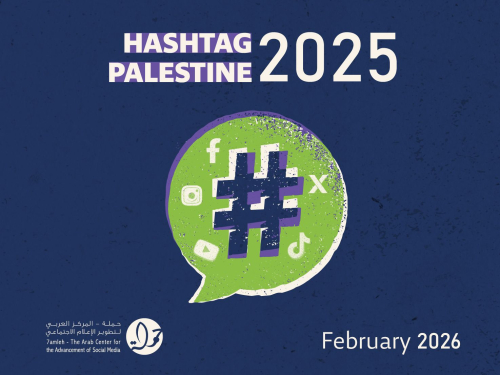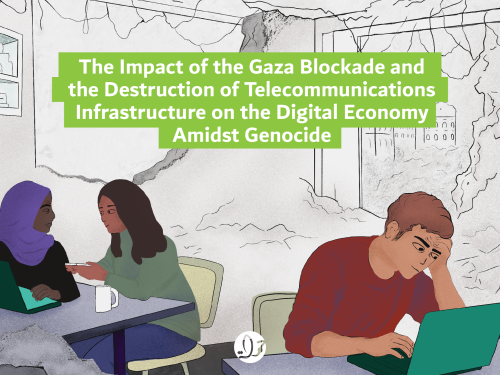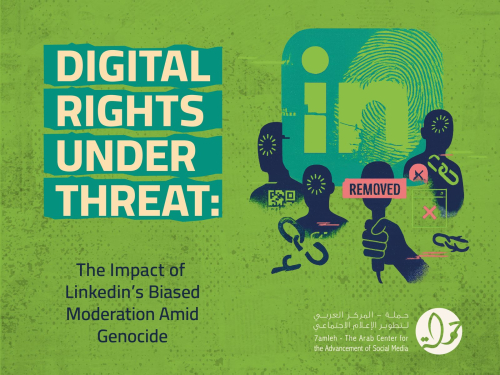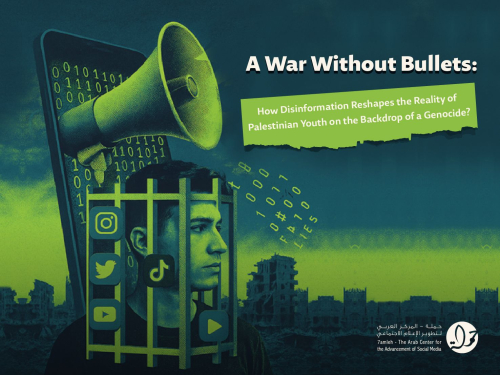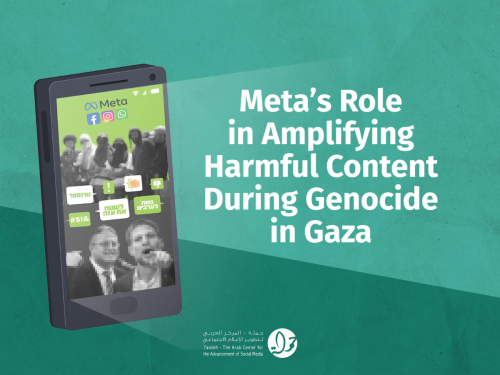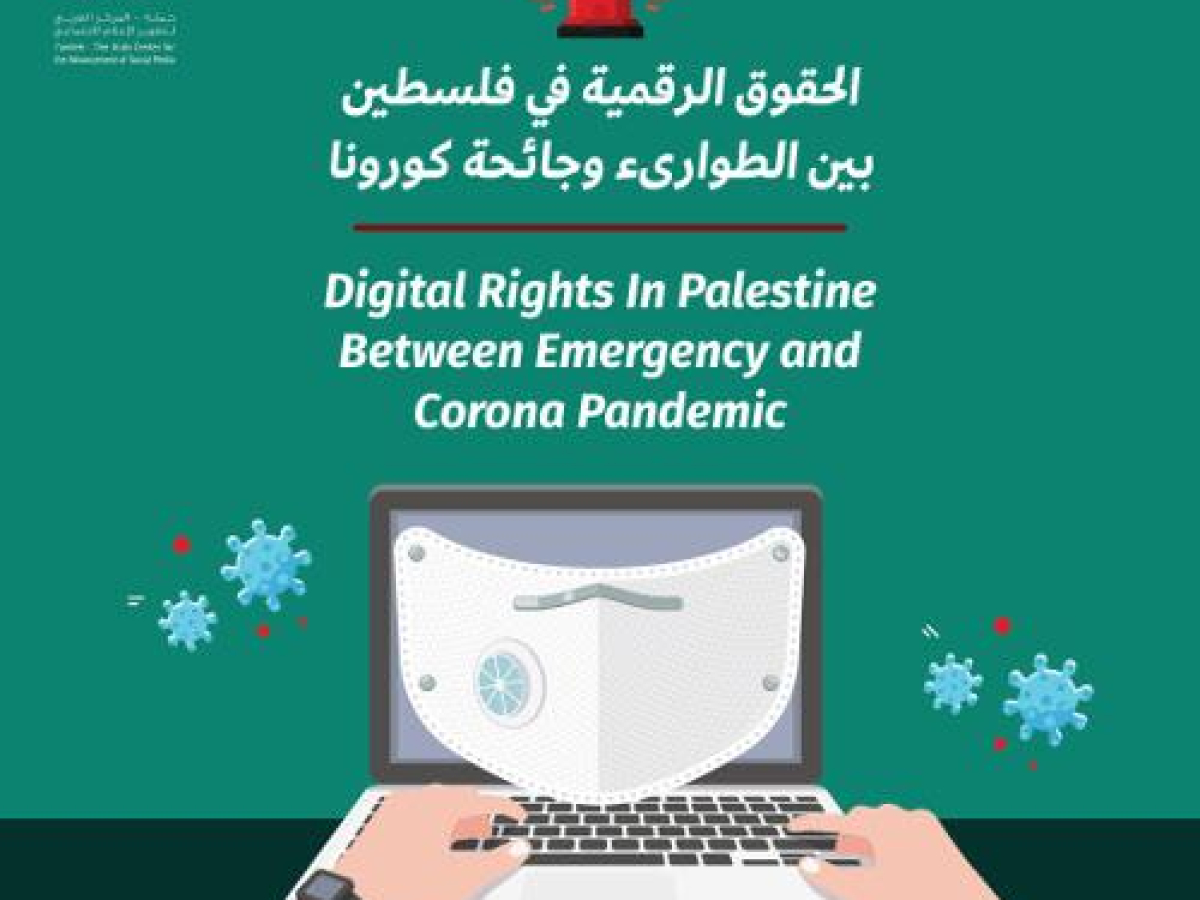
Digital Rights in Palestine Between Emergency and Pandemic
Prepared by Dr. Issam Abdeen
Download the PDF version here.
Background
The Palestinian President, Mahmoud Abbas, issued a decree on March 05, 2020, declaring a state of emergency in all of the Palestinian territories for one month to confront the coronavirus and prevent an outbreak. On March 22, 2020, he issued the State of Emergency Law by Decree that stipulates, among other issues, penalties for any person who violates the decisions, instructions, and measures applied by the official authorities to achieve the goals of the state of emergency. These penalties include one year of imprisonment and fines, without prejudice to any other penalties stipulated in other Palestinian laws. Moreover, the president issued a decree on April 03, 2020, to extend the state of emergency in all Palestinian territories thirty more days to confront the coronavirus and then a new presidential decree for the state of emergency was announced again until June 5, 2020.
The emergency legislation has explicitly targeted digital rights and privacy, among other things, and includes broad terms related to criminalization and punishment, with no legal provisions, safeguards, or measurable standards. Paragraph (3) of Article (3) of the State of Emergency Law by Decree stipulates:
It is prohibited for anyone other than those legally authorized to do so, to issue any statements or declarations, or spread news related to the state of emergency that are not based on an official source, in any form. This applies to all social media, written, audio, and visual. Anyone who violates this, shall be punished with detention for a period not exceeding one year and pay a financial fine not less than two thousand dinars and not more than five thousand dinars or its equivalent of the currency.
The terminology used in the State of Emergency Law by Decree is not defined nor mentioned in the applicable penal laws or the Palestinian legislative system and therefore it can be used extensively to restrict and criminalize digital content. Paragraph (7) of Article (3) of the State of Emergency Law by Decree stipulates: “Whoever commits any crime against public order, civil peace, and stability during the state of emergency, shall be punished with the maximum penalty prescribed by the law.” This makes it possible to criminalize and punish people widely.
The emergency legislation comes in light of ongoing setbacks to Palestinian digital rights. This includes the Cybercrime Law by Decree No. (16) of 2017 issued in the West Bank and the development of so-called “Misuse of Technology” crime under an amendment to the Penal Code in the Gaza Strip. These legislations were passed in secret and are considered by legal experts to be some of the most dangerous Palestinian legislations approved in regards to freedom of expression of opinion, digital rights, and the right to privacy in the history of the Palestinian Authority.
As a result of the Cybercrime Law by Decree of 2017, many journalists and social media activists have been arrested, and around thirty websites have been blocked. Some journalists are still being tried under the Cybercrimes Law, including Naela Khalil and Rami Samara. Since the emergency law has been announced,journalists and activists have been targeted as a result of the Cybercrime Law in addition to the emergency legislations.
Palestinian civil society organizations reacted to the cybercrime legislation with widespread protests. The United Nations Special Rapporteur on the promotion and protection of the right to freedom of opinion and expression, Dr. David Kaye, published a memorandum addressing the Palestinian government on August 16, 2017, expressing deep concerns over the blocking of Palestinian websites including those critical of the Palestinian Authority. Mr. Kaye also expressed his concerns over the impact of the Cybercrime Law by Decree on freedom of opinion and expression, media digital rights, and the right to privacy on the Internet in Palestine. He criticized the overbroad terms and severe penalties mentioned and their impact on censorship and self-censorship practiced by media outlets and individuals, particularly those who criticize the Palestinian Authority. This all has taken place in the absence of a law on the Right of Access to Information, which does not comply with Article (19) of the International Covenant on Civil and Political Rights to which Palestine acceded without reservations. Moreover, The Special Rapporteur called on the PA to take all necessary steps to review the Law by Decree on Cybercrime to ensure it is consistent with the obligations that International Human Rights Law entails.
The Palestinian government replied to the Special Rapporteur in September 2017 with a memorandum that included 15 clauses, reaffirming, among other things that the “The President of the State of Palestine and the Prime Minister will amend any article that runs counter to the Palestinian Basic Law or is incompatible with the State of Palestine’s obligations under International Conventions.” After three failed rounds of dialogue that civil society had with the government, aimed at ensuring that the Cybercrime Law by Decree of 2017 complies with international agreements and standards, the Cybercrime Law No. (10) of 2018 was approved in secret and was published in the Official Gazette.
The current Cybercrime Law by Decree of 2018 still violates the Basic Law (the Constitution) and international agreements and standards, especially freedom of opinion, digital rights, and privacy. On October 17, 2019, the Ramallah Magistrate Court rendered a decision to block 59 websites premised on the Cybercrime Law by Decree of 2018; specifically, Article (39) which stipulates:
(1) The competent authorities of investigation and seizure, in the event they monitor hosted electronic websites broadcasting either inside or outside the State, post any expressions, figures, images, films, advertising materials or else, which may threaten the national security, public order or public morals, shall be entitled to submit a report thereon to the Attorney General, or one of his assistants, and request the permission to block the broadcast of the electronic website(s) or block some of their links.
(2) The Attorney General, or one of his assistants, shall submit the request for permission to the Magistrate Court within 24 hours, enclosed with a memorandum of his opinion. The Court shall render its decision on the request at the same day it is brought before it; stating either its approval or rejection, provided that the duration of the blockage does not exceed six months unless the duration is renewed in accordance with the procedures provided under this Article.
The aforementioned legal text – and others – clearly use overbroad and loose terms (national security, public order, public morals). It allows blocking websites within 24 hours without guarantees and a fair trial and is contrary to and in violation of international standards. In addition, the period in which websites can be blocked (six months) has been made extendible to an unspecified time. Moreover, the records of the Palestinian security services play a crucial role in the process of blocking the websites, which explains the ongoing blocking of websites since 2017 until today. They also play a role in the ongoing surveillance, tracking and arrests of journalists and social media activists and shrinking the space for freedom of expression online. All of this is taking place in the absence of a functioning Legislative Council, which is an ongoing serious constitutional defect in the Palestinian context, in addition, to the disruption of the general elections, and the ongoing deterioration of the judiciary and the justice system in Palestine.
Criminalizing and punishing posts, statements, or news on social media related to the state of emergency, by all means, provides more space for restrictions on freedom of opinion, privacy and digital rights in emergency legislations. Any post can be criminalized as long as it is not premised on an official source; regardless of whether it is true or false. In addition to these measures, there is insufficient transparency and government plans to deal with the pandemic. Even though civil society is working to document arrests related to digital content, only the official news is reaching the public. This foreshadows the further challenges and constraints that Palestinians will face in the coming stages as the health, economic, social, and psychological consequences of the crisis aggravate.
Analysis of the Emergency Legislation in Relation to Digital Rights
The Presidential Decree of the state of emergency is unconstitutional, as it violates the provisions of Article (110) of the Basic Law under Title Seven (State of Emergency Provisions). The text limits the cases that permit the declaration of a state of emergency to four areas (war, invasion, armed insurrection, or in times of natural disaster). Therefore, the objective of declaring a state of emergency to confront the coronavirus and prevent an outbreak does not fall under the four exclusive constitutional reasons that permit declaring a state of emergency. A global pandemic is described as an infectious disease spreading and transmitting from one person to another in multiple countries around the world at the same time. Thus, it can hardly be argued that the coronavirus is caused by nature regardless of its severity.
Also, the decree extending the state of emergency for thirty more days violates the provisions of Article (110) of the Basic Law, which requires the approval of two-thirds of the members of the Palestinian Legislative Council. According to the Constitution, the state of emergency cannot be extended unless this procedure takes place. The State of Emergency Law by Decree, which has deepened the digital rights crisis in Palestine, is based on unconstitutional emergency legislation due to its violation of the provisions of the Palestinian Basic Law (the Constitution). Therefore, this law by decree is unconstitutional. Also, Article (110) of the basic law shall not allow for any new announcement for the state of emergency to take place after the extension period mentioned in the constitutional article No. (110) is over. This means that the latest announcement for the extension of the emergency law until June 5, 2020 is also unconstitutional.
Furthermore, since the Palestinian official authorities claim that the emergency legislation was issued to protect the health and lives of people, it is necessary to stress that this statement (the argument) is unfounded. The existing Palestinian ordinary laws address the goal of (protecting the health and lives of people) in a more pronounced, detailed, and professional manner and impose severe punishment on those more than is stipulated in the emergency legislation.
Ordinary Palestinian laws should be enacted to protect the health and lives of people, while no unconstitutional emergency legislation violating rights and freedoms, especially freedom of expression, digital rights, and privacy shall be passed. The Palestinian Public Health Law of 2004 and its amendments address various aspects related to combating communicable and non-communicable diseases in detail. These aspects include the health means and measures necessary to deal with the diseases; monitoring their transmission rates and collecting relevant indicators; preventive and remedial measures necessary to limit their spread; health education programs; necessary measures to prevent their transmission to and from Palestine; procedures for quarantine; measures to isolate diagnosed and suspected persons as well as contacts; control and inspection procedures; and more severe penalties than those provided for in the emergency legislation. The Consumer Protection Act of 2005 and its amendments also detailed the rights of the consumer. The law aims to protect the consumer from any health hazards and her/his rights to obtain goods and services that are consistent with the Binding Technical Instructions in a transparent manner. It also prohibits and criminalizes fraud, deceit, price manipulation, and commodity monopoly, and addresses product safety and the integrity of economic and other transactions. It stipulates more severe penalties than those prescribed in the emergency legislation for anyone who displays, sells, or stores spoilt, damaged, adulterated, expired, or forged food commodities; manipulates the date of their validity; refrains from displaying or selling food commodities; and manufactures, sells, displays for sale or distributes any materials or goods or equipment that are used in forgery. The law also states other crimes that have severe penalties. There are further penal provisions stipulated in the Anti-Corruption Law 2005, the Civil Defense Law 1998, and the Penal Code 1960 and its amendments and other applicable ordinary laws. As a result, there is no justification for nor any of the objectives of the emergency legislation.
The emergency legislation is not designed to protect people's health and lives, as this goal is mainly addressed in the ordinary legislation in force before declaring the state of emergency. Besides, the emergency legislation did not provide anything new in this regard. Consequently, it is a matter of official authorities' failure to apply ordinary laws, which should not be a justification for issuing the unconstitutional emergency legislation. Furthermore, the emergency legislation text uses overbroad and loose terms to criminalize statements, proclamations, and news on social media and any other means during the emergency phase, whether true or false. This is the only "new" aspect of the emergency legislation and what distinguishes it from the ordinary legislation.
There is another "new" aspect that the unconstitutional emergency legislation brings about in comparison with the ordinary Palestinian legislation. It is the fabrication of new crimes using broad and loose wording. A person cannot evaluate her/his behavior based on these texts and know when they may or may not be criminalized (a crime against public order, peace, and stability during the state of emergency). The texts can be used extensively to restrict digital content. The "new" emergency legislation is a further restriction of freedom of opinion, digital rights, and privacy, and this constitutes a new setback in addition to the Cybercrime Law by Decree.
It has been almost two months since the state of emergency started, yet, the Palestinian government still has not announced its plan to confront the coronavirus pandemic at the health, economic, social, and psychological levels. Moreover, the Right to Access Information Law by Decree has not been issued for more than fifteen years and remains unreleased since 2005. To date, no Palestinian law has been issued to protect personal and health data, although the right to access information; a third-generation human right (a right for society as a whole); and the right to privacy; especially on the Internet, are among the constitutional rights guaranteed under Title Two of the Palestinian Basic Law under “Public Rights and Freedoms”. In addition, violating those rights, including digital rights, is a constitutional crime under Article (32) of the Palestinian Basic Law (the Constitution). This crime is not imprescriptible, and any person the Palestinian Authority harms shall be fairly compensated in accordance with this constitutional text.
In contrast, the State of Emergency Law by Decree does not only criminalize sharing fake news but also accurate ones if not obtained from an official source. Thus, the official news about handling the coronavirus pandemic at the various levels and its health, economic, social and psychological implications, remain the only dominant and exclusive narrative subject to liability and punishment. Therefore, people are being deprived of their constitutional and natural right to provide oversight and criticize the performance of official authorities in dealing with the pandemic.
The spread of inaccurate news, in times of crises, as well as the fear for health and life is inevitable; especially in light of the official authorities failure to publish a plan that shows how to deal with the pandemic at the various levels; the absence of transparency in the government’s work; the absence of community partnerships; and not enabling people to access their rights to information and protection of their data. This failure shall not be addressed through the legalization of a violation of constitutional rights and freedoms and the obligations of the State of Palestine under the basic human rights conventions to which it acceded without reservations. Nor shall this nonfeasance be resolved by bullying people in official discourse, exploiting people's fear and anxiety, violating their personal and health data, and passing legislation backstabbing human rights.
Several methods and tools can be used to remove inaccurate news while respecting human rights and dignity. These methods include publishing a clearly defined plan for people on how to confront the pandemic at the various levels, while respecting people’s privacy and right to access information. They also include increasing public awareness-raising programs on a wide scale, in an organized persistent legal and media program, to present people with facts and fight rumors. Besides, the official authorities can publish fact sheets, increase the use of fact-checking platforms, raise the public awareness of these platforms and promote them, and integrate all those methods into schools, institutes, universities, legal education, and teaching methods.
Individual and collective human rights shall not be fragmented nor compromised, waived, or neglected under any circumstances or conditions as they are the basis for solidarity and interdependence. Waiving or neglecting these rights under claims that this may not be the right time for the constitution, law, and rights because we are in danger, jeopardizes the rights of both individuals and groups sooner or later, regretfully. There is no legal need for emergency legislations to tackle the coronavirus, and the emergency legislations are in violation of the constitution and human rights systems.
The cybercrime and emergency legislations are extremely dangerous to freedom of expression, digital content and privacy. Also, when a state of emergency is declared constitutionally, the approach shall always find a balance rather than empty these rights of their meaning and put them at high risk. The approach shall also comply with the constitutional guarantees in the Palestinian Basic Law (the Constitution) regarding the state of emergency, specifically the conditions of "necessity and proportionality" in Article (111) of the Basic Law. The article stipulates: "It is not allowed to impose restrictions on fundamental rights and freedoms when declaring a state of emergency except to the extent necessary to fulfill the purpose stated in the decree declaring the state of emergency.” Moreover, any restrictions on rights, including digital rights, must pass the three-part strict scrutiny as per human rights conventions, whether in normal conditions or during the state of emergency.
Any restriction on freedom of expression, digital rights, and privacy must successfully pass three levels of "strict scrutiny" to establish its validity, in accordance with international standards. The first: It is stipulated in the law using clear and precise text that individuals can judge their actions through and in accordance with international law. No vague and loose terms shall be used as they empty the rights of their essence. The second: This restriction - which successfully passed the first level - is aimed at protecting a legitimate and recognized interest in international law. The third: This restriction - which successfully passed the second level - is necessary to protect that legitimate interest in the law. The official authorities must prove that the restriction has successfully passed the three levels, otherwise, it will be considered a violation of rights.
Countries’ experiences prove that governments are powerful in controlling information data and individuals’ personal and health data by various means and methods. Besides, the governments and their security apparatuses can use information data and personal data that they obtained in times of crisis while exploiting people's fear in different times and forms. This means that the government can violate human rights and dignity. The cybercrime law and emergency legislation with their broad terminology, absence of privacy all violate the Constitution and international human rights standards, is a recipe for the violation of human rights and dignity.
The Emergency Legislation and Violations of Digital Rights
The Presidential Decree was issued on March 5, 2020 declaring a state of emergency in all Palestinian territories to confront the coronavirus and prevent its spread, as stated in the decree. Since then, civil society institutions have documented violations of freedom of opinion and expression and digital rights. The Palestinian Center for Development and Media Freedoms’ monthly report on the violation of media freedoms in Palestine documented 31 violations in March 2020. According to the report, Facebook committed half of those violations (16). The Palestinian Authority committed 11; 9 in Gaza and 2 in the West Bank that included torture and ill-treatment. The Israeli authorities committed 4 violations of media freedoms.
On March 5, 2020, the security forces stormed the house of a former member of the Legislative Council and Fatah leader, Hossam Khadr, in Balata camp, east of Nablus, against the backdrop of posts on his Facebook page criticizing the position of President Mahmoud Abbas regarding the Palestinian doctors’ strike in the West Bank, demanding the president to apologize. The security forces in the West Bank also arrested Dr. Amid Masoud from his clinic in Huwara town, south of Nablus, against the backdrop of posts on his Facebook page regarding the doctors’ strike and criticizing President Mahmoud Abbas and his sons.
On March 20, 2020, cartoonist Ismail Al Buzm was arrested in Jabalia, north of Gaza, due to Facebook posts calling for the release of Abu Sharkh.
On March 25, 2020, the security forces in Gaza arrested W. F. (name withheld as per the victim’s request), a resident of Khan Yunis, against the backdrop of Facebook posts criticizing the locations and conditions of the quarantine in Gaza describing them as “ Guantanamo prison.” He was presented to the public prosecution, arrested for fifteen days on charges of "misusing technology," and imprisoned. His post was deleted two days before his arrest.
On March 31, 2020, the security forces in Gaza arrested the writer and critic, Abdullah Abu Sharkh, because of his opinions and posts on his Facebook page about a fire in Nuseirat camp and the spread of the corona epidemic. He was charged with "misusing technology and spreading rumors disrupting reassurance." He was arrested for fifteen days and sent to the Abu Ubaida Central Prison in Beit Lahia.
On April 12, 2020, Al-Haq documented the arrest of three citizens in the West Bank, including youth activist Raed Marabeh by the governor of Qalqilya because of posts on their Facebook pages regarding workers inside present day Israel and the corona pandemic. The security services in Gaza also arrested Muhammad Saqr, a resident of Khan Yunis, because of his Facebook posts criticizing Hamas and the head of its political office, Yahya al-Sinwar. Saqr was presented to the public prosecution, arrested for fifteen days pending investigation on charges of "misusing technology," and imprisoned.
On April 25, 2020, according to Al-Haq, the security forces in the Gaza Strip also arrested Palestinian TV reporter Salim Abu Hatab, from Khan Yunis and his colleague, photojournalist Muhammad Nassar, as they were working on a press report on the impact of the Corona crisis on merchants in local markets during Ramadan. They were forced to sign a pledge not to film without obtaining a permit prior from the Ministry of Interior in Gaza.
The Independent Commission for Human Rights (ICHR) issued a press release in which it condemned the security forces in the Gaza Strip arresting Palestine TV staff while doing their work in Jabalia camp, north of Gaza. It described the arrests as an attack on the freedom of journalism. In the press release, ICHR emphasized that requiring journalists to obtain a permit to do their work undermines freedom of the press.
On April 29, 2020, the Geneva-based Euro-Mediterranean Human Rights Monitor published a statement calling for the Governor of Ramallah, Dr. Laila Ghannam, to release Ahmed Al Khawaja. Al Khawaja was arrested after he commented on Dr. Ghannam’s Facebook page, expressing his surprise at closing mosques due to the corona pandemic while allowing the Christians to hold Easter celebrations. The statement indicated that the security services arrested Al Khawaja, and the public prosecution detained him for 15 days to investigate the charge of "stirring sectarianism." The statement added that the comment is considered freedom of expression and opinion as it is simply a question from a citizen on a personal page of an official and does not insult anyone nor stir sectarianism and asked if it was possible to explain to him and to the audience why he was arrested .
Recommendations
1. The Palestinian Authority and the authority in Gaza shall release all detainees held for exercising their freedom of expression and their engagement online. They shall treat victims fairly, hold all those who violated their rights accountable, and respect freedom of expression and a free cyberspace without discrimination. This is a right guaranteed to citizens in the Basic Law (Constitution) and international agreements and standards.
2. The Palestinian Authority shall issue a law on the right to access information that complies with international human rights agreements and standards, enhancing freedom of expression and digital rights, and limiting false news regarding the corona pandemic.
3. The Palestinian Authority shall issue a law that guarantees the protection of personal and health data, in accordance with international standards and the Basic Law (Constitution) which ensures the protection of the rights to privacy and to access information.
4. The competent parties in the Palestinian Authority shall hold accountable all those who violated the right to protect the personal and health data of citizens. As lists of citizens’ names and health data issued by the Palestinian Ministry of Health were leaked and circulated on social media, people affected shall be compensated as stipulated in Article (32) of the Basic Law.
5. The Palestinian Authority shall review the Cybercrime Law by decree No. (10) of 2018. The Law by Decree has been met by Palestinian civil society objection. Besides, the Palestinian Authority shall fulfil the obligations it pledged in its response to the Special Rapporteur in September 2017 to promote freedom of opinion, digital rights, and privacy. Moreover, the Palestinian Authority shall ensure that it fully complies with international human rights conventions and standards and best practices, in particular the Budapest Convention for Cybercrime, the International Covenant on Civil and Political Rights, the International Principles on the Application of Human Rights to Communications Surveillance issued in 2014, and the relevant international guidelines and best practices. Furthermore, it shall cancel the "Misuse of Technology" crime that resulted from the amendments to the Penal Code in Gaza.
6. The Palestinian Authority, in partnership with civil society, shall immediately review 8 legal articles in the Cybercrime Law by decree No. (10) of 2018 to comply with the following international agreements, standards and best practices, respectively:
A) Amend Article (3) which provides for the establishment of a specialized cybercrime unit in the police and security forces, reduce it to one unit that reports to the police and operates under the supervision of the public prosecution, and restrict the judicial control over cybercrime to the police.
B) Amend Article (29) that permits the dissolution of a legal person (a media institution, for example) and the necessity to comply with the conditions of "necessity and proportionality" in accordance with international standards in any action taken in this regard. For the dissolution to take place, an independent court in which fair trial guarantees are respected shall provide a court ruling. Besides, these procedures shall be exclusive to serious crimes, and those crimes shall be identified clearly and precisely in the law and in accordance with international human rights conventions and standards.
C) Amend Article (31) which obliges the service provider to provide the competent authorities with subscriber information that helps in revealing the truth at the request of the public prosecution or the competent court. The Palestinian Authority shall comply with the conditions of "necessity and proportionality" according to international standards in any action taken, and that it must be done through an independent court only where a fair trial is guaranteed in order to achieve a legitimate and worthy goal in accordance with international standards. This procedure shall be exclusive to serious crimes, and those crimes shall be identified clearly and precisely in the law and in accordance with international standards.
D) Amend Articles (32) and (33) that permit the public prosecution or those it delegates from the judicial control (security agencies) to obtain devices, electronic data, traffic information, communication traffic-related data, subscriber information, or information technology inspection, or authorize seizing the entire information system or part of it or copying the data among others. The conditions of “necessity and proportionality” shall be applied in any action taken in accordance with international standards, and that it be carried out only through an independent court in which a fair trial is guaranteed, to achieve a legitimate goal worthy of protection and care.
E) Amend Article (34) that permits the Attorney General or one of her/his assistants to collect any data, including communication, electronic information, and traffic data, or subscriber information that she/he deems necessary for the interest of the investigation. Permission must be obtained from a competent and independent court that guarantees a fair trial. The measure shall comply with the conditions of "necessity and proportionality."
F) Delete Article (39) that permits blocking websites based on the records of the security services that are submitted to the Public Prosecutor or one of her/his assistants to obtain a decision from the Magistrates Court to block them within 24 hours under overbroad terms related to national security, public order, and public morals. The Ramallah Magistrates Court used this text to block 59 websites at once in 2019. This text shall be deleted for its serious violation of digital rights and fair trial guarantees.
G) Delete Article (45) which stipulates that each person who perpetrates an act that constitutes a crime under any effective piece of legislation, using the electronic network or a means of information technology shall be liable to the same penalty which is prescribed for such crime under that piece of legislation. This article adds several crimes using broad terms in the Cybercrime penalty code and dangerously violates digital rights and international standards.
H) Add an article as follows: “It is prohibited to interpret or modify any text in the Cybercrime Law by Decree in a manner that violates the freedom of expression, digital rights and privacy guaranteed in international human rights conventions and standards.” This will ensure that the Cybercrime Law by Decree fully complies with international human rights conventions and standards.
7. The Palestinian Authority shall unblock the websites that were blocked in 2017 and 2019 (around 30 and 59 websites, respectively). This is a violation of the freedom of expression and digital rights guaranteed in the Palestinian Basic Law (the Constitution) and international agreements to which the State of Palestine acceded without reservations, in particular the International Covenant on Civil and Political Rights (Article 19). The Palestinian Authority is obliged to enhance and protect the right to freedom of opinion and expression as per its response to the memorandum of the UN Special Rapporteur in September 2017. Since then, the PA pledged to ensure that the Cybercrime Law complies with the Basic Law and International Standards.
8. Stop the implementation of emergency legislation that violates the Basic Law (the Constitution) and international agreements and standards, as measures to tackle the coronavirus and prevent its spread are detailed in Palestinian ordinary laws. The legislation adds to the violation of freedom of expression of opinion, digital rights, and privacy of the Cybercrime Law by Decree. The state of emergency shall not be extended through a presidential decree nor a law by decree, as it is a serious threat to the human rights system and values.
9. Civil society institutions shall strengthen their efforts to monitor and document violations, including digital rights, establish a joint database, and organize their collective efforts to defend human rights, hold perpetrators accountable, and bring justice to victims.
10. Intensify efforts to prevent fake news on the corona pandemic through collaborative legal and media work, presenting facts to people, publishing fact sheets, promoting the use of fact-checking platforms, and raising awareness.
11. Conduct an advocacy campaign to protect and promote freedom of opinion and expression, digital rights, and privacy against the violations resulting from the Cybercrime Law by Decree in the West Bank, the “Misuse of Technology” code in Gaza, and the emergency legislation that deepened violations of digital rights. Also, hold government accountability sessions in this regard, and use appropriate United Nations mechanisms.
Sources
Palestinian legislations
1. The Amended Palestinian Basic Law (the Constitution). Published in the Palestinian Official Gazette. March 19, 2003 and August 18, 2005.
2. The Corona Pandemic Emergency Legislation. Published in the Palestinian Official Gazette No. (165) of March 19, 2020, No. (166) of 20 April, 2020 and No. (21) of 25 March, 2020
3. Cybercrime Law by Decree No. (16) of 2017. Published in the Palestinian Official Gazette No. (14) of 9 July, 2017.
4. Cybercrime Law by Decree No. (10) of 2018. Published in the Palestinian Official Gazette No. (16) of May 3,2018.
5. The Penal Code No. (16) of 1960 and its Amendments (West Bank). Published in the Jordanian Official Gazette No. (1487) ( during Jordanian rule of the West Bank).
6. The Penal Code No. (74) of 1936 and its Amendments (Gaza Strip). Published in the Palestinian Official Gazette No. (652) (during the British Mandate of Palestine).
7. The Public Health Law No. (20) of 2004. Published in the Palestinian Official Gazette No. (54), April, 2005.
8. The Consumer Protection Law No. (21) of 2005. Published in the Palestinian Official Gazette No.(63), April, 2006.
International and regional agreements and standards
1. United Nations Office of the High Commissioner on Human Rights. (1976). The International Covenant on Civil and Political Rights. Retrieved from: https://www.ohchr.org/EN/ProfessionalInterest/Pages/CCPR.aspx
2. Council of Europe. (2001). Budapest Convention on Cybercrime. Retrieved from: https://www.coe.int/en/web/conventions/full-list/-/conventions/treaty/185
3. Necessary and Proportionate. (2013). The International Principles on the Application of Human Rights to Communications Surveillance. Retrieved from: https://necessaryandproportionate.org/
4. United Nations Office of the High Commissioner on Human Rights. Special Rapporteur on the Promotion of Freedom of Expression and Opinion. Retrieved from: https://www.ohchr.org/EN/Issues/FreedomOpinion/Pages/Annual.aspx
5. United Nations Office of the High Commissioner on Human Rights. The Right to Privacy in the Digital Age. Retrieved from: https://documents-dds-ny.un.org/doc/UNDOC/GEN/G13/133/03/PDF/G1313303.pdf?OpenElement
https://documents-dds-ny.un.org/doc/UNDOC/LTD/G16/131/89/PDF/G1613189.pdf?OpenElement
Legal papers
1. Abdeen, Issam. Al Haq. (2018). Measures Taken By Al Haq to Counter the Law By Decree on Cybercrime. Retrieved from: http://www.alhaq.org/publications/8055.html
2. Abdeen, Issam. Al Haq. (2019). Position Paper on the Cybercrime Law by Decree and Blocking Websites. Retrieved from: http://www.alhaq.org/advocacy/16110.html
3. MADA. (March 2020). 31 Violations Against Media Freedoms in Palestine During March, Most of which were Committed By Facebook. Retrieved from: https://www.madacenter.org/en/article/1290/
4. Independent Commission on Human Rights. Retrieved from: https://bit.ly/3bdOaL8
Related Articles
Subscribe to Our Email Alerts
And stay updated with our latest activities, news, and publications!

